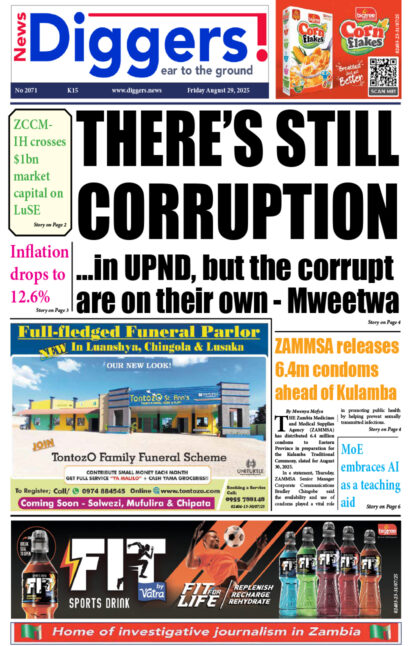Finance Minister Felix Mutati says Zambia needs to reduce its appetite for contracting debts.
And Mutati says the IMF bailout request has not failed, as negotiations were still ongoing.
Speaking in parliament on Thursday when he winded up debate on the 2018 national budget, Mutati said because of the high levels of debt, there was need to focus all the efforts on domestic resource mobilisation.
“On the issue of fiscal consolidation Mr Speaker, we have said and committed that we are going to support measures with legislation in particular. Our commitment is that the public finance Act, the Loans and guarantees Act, and the budget Act should be able to be passed by the end of 2017. We have said, Mr Speaker, that this is our determination to support fiscal consolidation which is important in dealing with the whole issue of debt. Beyond that Mr Speaker, we have also put in measures to tackle the debt issues. We published the medium term strategy which is basically focusing on the whole framework of debt. We must focus on finishing ongoing projects before we embark on new ones. And we must reduce our appetite to contract debt. We must also look at other innovative ways of raising finance,” Mutati said.
“Mr Speaker, we were quiet clear in our presentation of the budget 2018 that the debt levels have elevated and in that budget, we said the answer to curing debt is (I) to focus our efforts on domestic resource mobilisation. In focusing on that Mr Speaker, we have said that we are going to modernise the Zambia Revenue Authority, ensuring that we improve tax collection methods. Bringing in the automation and ICT and also benchmarking them to the very best…,” Mutati said.
He said government would create a sinking fund that would assist in dealing with maturities of the Euro Bond.
“But also important Mr Speaker, we have said in 2018, we are going to commence the process of creating a sinking fund that is going to assist in parts, to deal with the maturities of the Euro bond when they do mature. We have at the Ministry of Finance, continued to increase the capacity of personnel, particularly in the debt department including raising our ability for the quality of data which is critically important for us to undertake critical debt sustainability analysis. We have said the anchor for any new debt shall be based, Mr Speaker, on debt sustainability. We do not want to lamb-debt to future generation. We think by doing those things Mr speaker, we will begin to address the critical issue of debt. And as you do that Mr Speaker, you are also answering to the issue of fiscal deficit because they do go hand-in-hand,” Mutati said.
H argued that that the IMF bailout package was still in the offing.
“Mr Speaker, let me just borrow a common phrase, and this common phrase is called bailout. And let me just make it clear to this August house that this phrase called the bailout has not failed. The IMF bailout has not failed because our program has not yet been taken to the IMF board, thats number one. Number two Mr Speaker, what was taken to the board is called Article 4 surveillance. This is where the staff from IMF carryout an assessment on the economy on its performance, its financial policies, engage with government, engage with parliamentarians etc,” Mutati said.
“Its a routine exercise that is done typically every year. And the outcomes of Article 4, Mr Speaker, we re very very clear. (I) Article 4 recognised that the economic outlook for Zambia is positive; (ii) it also commended the government of Zambia that it has been able to conclude and publish the 7th NDP including the economic stabilisation and growth program; (iii) it also commended the government for taking decisive and bold decision with regard to policy and reforms in particular in agriculture and energy; it also commended (iv) that the social protection has been elevated in 2017. the sticking point was that the debt had elevated.”
He said the IMF team would return to Zambia to help his ministry make a debt profile to support growth and avoid shocking the economy.
“So when we engage with IMF, they said we needed to determine the new path for the debt and in order to determine a new path, we need information and data which we are working together with them (IMF) and they will be back in a few weeks time so that we can have a debt profile that is based on debt sustainability going forward. We can have a debt profile that not only supports growth but also ensures that we do not shock the economy. Once we have done that Mr Speaker, then we will be able to move forward on this particular issue. Mr Speaker, this, we are determined to do because at the end of the dividends for stability and growth, we will accrue to the ordinary person, the ordinary people of Zambia,” Mutati said.
“It is within our responsibility to ensure that we keep the economy in the right direction , ensuring not only stability but growth that is inclusive. And that is why we have emphasised, Mr Speaker, that the theme for 2018 will be ‘accelerating fiscal fitness’. Fiscal fitness means that we are going to focus on your domestic revenue collection, fiscal consolidation and ensuring that your fiscal deficit is in check including ensuring that we achieve debt sustainability. That is the direction that we are taking Mr Speaker and we owe it to the people of Zambia to ensure that the economy performs for them.”
The Minister said that the 2018 budget credibility would be assisted by passing key legislations that would minimise misappropriation and diversion of funds.
“Mr Speaker, an issue of budget credibility has been raised. Mr Speaker, government remains concerned with the issue of budget credibility and that is why Mr Speaker we are saying in 2018, that this credibility will be assisted by passing key legislation that minimises issues around misappropriation of funds and also diversion of funds. So we will be bringing this legislation to assist us so that we are tighter and tighter in the use of public funds. Mr Speaker, this will also include the public procurement Act,” said Mutati.
“Mr Speaker as you know, the current Act, the public procurement Act is a compliance based law and simply put it means you have to tick the boxes (I) have you advertised? The answer is either yeas or no, you tick (ii) have people responded? You tick, (iii) have people sat and been able to make a decision? You tick. For the sake of clarity so that we don’t bit about the bush, Have you advertised for fire tenders? The answer is yes or no, you tick. The change in the legislation Mr Speaker will focus on the value for money, which means that we are going to benchmark the prices for similar items so that if I buy a ream of stationary in the Ministry of Finance, it should be within 10 percent in the Ministry of Community Development. Otherwise the system rejects. And that is what is called value for money. So all these things that have taken us back will be answered in parts with the revision of the Public Procurement Act.”























